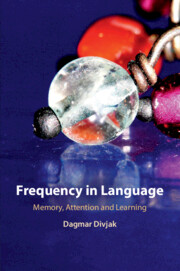Book contents
- Frequency in Language
- Frequency in Language
- Copyright page
- Dedication
- Contents
- Figures
- Table
- Acknowledgements
- Introduction
- Part I
- Part II
- Part III
- Part IV
- 8 Predicting: Using Past Experience to Guide Future Action
- 9 Learning: Navigating Frequency, Recency, Context and Contingency
- 10 By Way of Conclusion
- References
- Index
10 - By Way of Conclusion
from Part IV
Published online by Cambridge University Press: 26 September 2019
- Frequency in Language
- Frequency in Language
- Copyright page
- Dedication
- Contents
- Figures
- Table
- Acknowledgements
- Introduction
- Part I
- Part II
- Part III
- Part IV
- 8 Predicting: Using Past Experience to Guide Future Action
- 9 Learning: Navigating Frequency, Recency, Context and Contingency
- 10 By Way of Conclusion
- References
- Index
Summary
We take it for granted that any infant, in only a few years’ time, will master at least the basics of a highly complex symbolic system. Indeed, children achieve impressive results in a very limited time while working from what appears to be very limited input. Nativists posit that at least some knowledge needs to be present at birth for these results to be achieved so quickly. But our linguistic achievements appear to have been overestimated: the road to mastery is long, and we continue to learn throughout our lives. Moreover, there is scientific virtue in holding off on positing innate mechanisms until all alternative routes have been explored. One such alternative route is the usage-based one: it presupposes nothing but a few basic cognitive capacities that support the development of a wide range of abilities, including language, through interactions with the environment.
Information
- Type
- Chapter
- Information
- Frequency in LanguageMemory, Attention and Learning, pp. 260 - 275Publisher: Cambridge University PressPrint publication year: 2019
